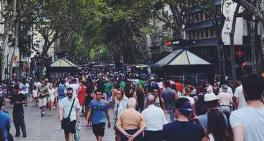High court won't hear abortion clinic 'buffer zone' cases
Featured Legal News
The Supreme Court on Thursday turned away pleas from anti-abortion activists to make it easier for them to protest outside clinics, declining to wade back into the abortion debate just days after striking down a Louisiana law regulating abortion clinics.
The justices said in a written order that they would not hear cases from Chicago and Harrisburg, Pennsylvania, where anti-abortion activists had challenged ordinances that restrict their behavior outside clinics.
As is usual, the justices did not comment in turning away the cases. The order from the court noted Justice Clarence Thomas would have heard the Chicago case.
The Supreme Court has since the late 1990s heard several cases involving demonstration-free zones, called buffer zones, outside abortion clinics. Most recently, in 2014, the justices unanimously struck down a law that created a 35-foot protest-free zone outside Massachusetts abortion clinics. The court said Massachusetts’ law, which made it a crime to stand in the protest-free zone for most people not entering or exiting the clinic or passing by, was an unconstitutional restraint on the free-speech rights of protesters.
On Thursday, one of the two cases the court declined to take up involved an ordinance passed by the city counsel in Harrisburg, Pennsylvania's capital, in 2012 that made it illegal to “congregate, patrol, picket or demonstrate” in a zone 20 feet from a health care facility. Anti-abortion activists sued, arguing that the ordinance violates their free speech rights. Lower courts have upheld the ordinance, however, ruling it doesn't apply to “sidewalk counseling,” where individuals who oppose abortion offer assistance and information about alternatives to abortion to those entering a clinic.
Related listings
-
What Supreme Court? Trump's HHS pushes LGBT health rollback
Featured Legal News 06/20/2020The Trump administration Friday moved forward with a rule that rolls back health care protections for transgender people, even as the Supreme Court barred sex discrimination against LGBT individuals on the job. The rule from the Department of Health ...
-
UConn student fugitive in court on murder charge, police say
Featured Legal News 06/12/2020A University of Connecticut student, who police say used a machete to kill a man, fatally shot a high school acquaintance, and then spent six days as a fugitive, will be arraigned Friday on murder and other charges, authorities said.Peter Manfr...
-
Black Lives Matter rallies start in Australia amid court ban
Featured Legal News 06/07/2020The first of several Black Lives Matter protests across Australia on Saturday got underway against a backdrop of possible clashes between demonstrators and police in Sydney, after a court sided with police that the gathering posed too much risk for s...

USCIS to Begin Accepting Applications under the International Entrepreneur Rule
U.S. Citizenship and Immigration Services (USCIS) announced today it is taking steps to implement the International Entrepreneur Rule (IER), in accordance with a recent court decision.
Although the IER was published during the previous administration with an effective date of July 17, 2017, it did not take effect because the Department of Homeland Security (DHS) issued a final rule on July 11, 2017, delaying the IER’s effective date until March 14, 2018. This delay rule was meant to give USCIS time to review the IER and, if necessary, to issue a rule proposing to remove the IER program regulations.
However, a Dec. 1, 2017, ruling from the U.S. District Court for the District of Columbia in National Venture Capital Association v. Duke vacated USCIS’ final rule to delay the effective date. The Dec. 1, 2017, court decision is a result of litigation filed in district court on Sept. 19, 2017, which challenged the delay rule.




